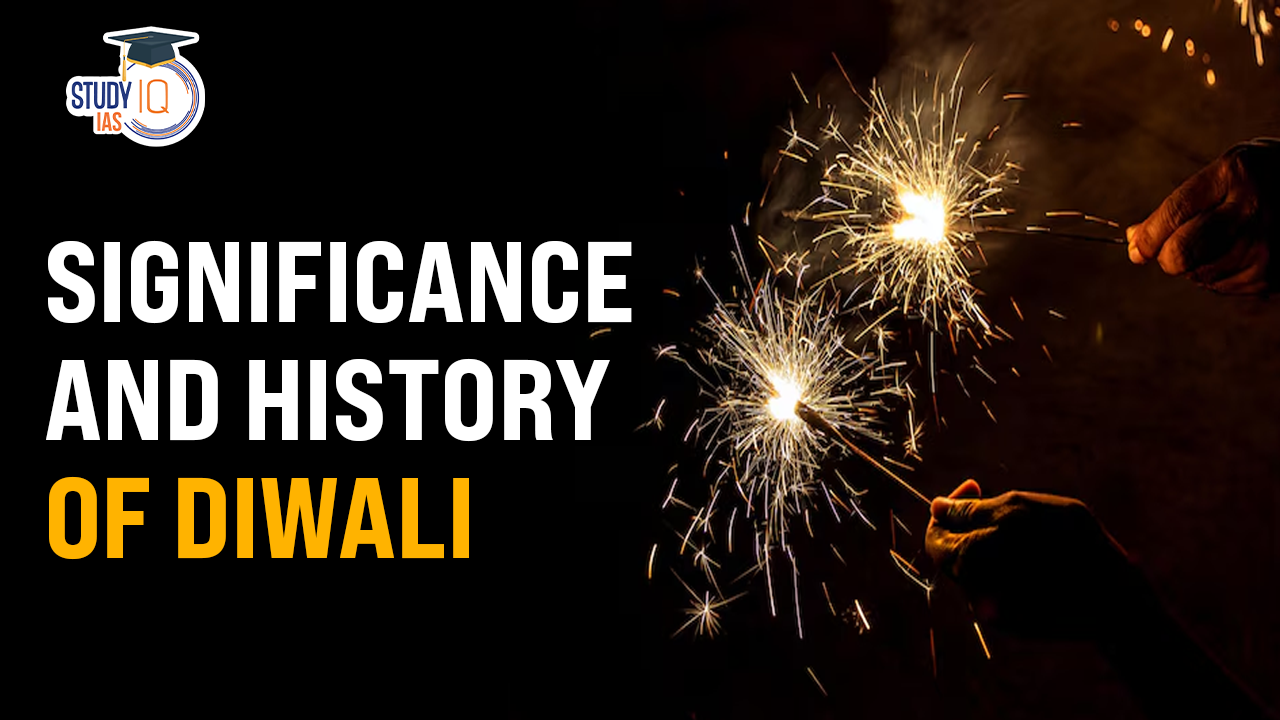Table of Contents
Diwali, also known as Deepawali, is one of the most important and widely celebrated festivals in India. Known as the “Festival of Lights,” Diwali signifies the victory of light over darkness, good over evil, and knowledge over ignorance. The word Deepawali is derived from the Sanskrit words “Deepa” (lamp) and “Avali” (row), meaning “a row of lamps.”
The festival unites millions of people across religions, regions, and cultures in celebration, marking joy, prosperity, and new beginnings.
Historical Background of Diwali Festival
The origins of Diwali can be traced back more than 2,500 years, likely beginning as an ancient harvest festival celebrated across India. While historical records pinpoint different stories across regions and religions, the common element remains the symbolism of light overcoming darkness.
Religious and Mythological Origins
-
Hinduism:
- Ramayana Tale: The most widespread story of Diwali is derived from the Ramayana, an epic Hindu text that narrates the life of Lord Rama. After 14 years of exile and victory over the demon king Ravana, Lord Rama returned to his kingdom, Ayodhya, where people lit oil lamps (diyas) to welcome him back. This tradition of lighting diyas has since been central to Diwali.
- Goddess Lakshmi: Diwali also celebrates the birth of Goddess Lakshmi, the deity of wealth and prosperity, on the new moon day of the Kartik month. Many worshipers dedicate Diwali to Lakshmi Puja, hoping for blessings of wealth and peace in the coming year.
-
Jainism:
- Diwali commemorates the day Lord Mahavira, the 24th Tirthankara, attained Nirvana or liberation. For Jains, Diwali is primarily a religious observance marking spiritual purity and freedom from worldly desires.
-
Sikhism:
- Sikhs celebrate Diwali as Bandi Chhor Divas, commemorating the release of Guru Hargobind Ji and 52 princes from Mughal captivity. The Golden Temple in Amritsar is illuminated, and this day is celebrated as a reminder of freedom, justice, and dignity.
-
Buddhism:
- While not universally observed by Buddhists, Diwali holds significance for those following Newar Buddhism in Nepal, where it symbolizes peace and prosperity.
Significance of Diwali Festival
Each ritual and practice associated with Diwali carries cultural and spiritual meaning. The festival’s five days include Dhanteras, Chhoti Diwali, Diwali, Govardhan Puja, and Bhai Dooj, each with its specific rituals that emphasize prosperity, family ties, and spirituality.
Symbolism of Light Over Darkness
Diwali’s core theme is the triumph of light over darkness, representing not just physical illumination but also the spiritual conquest of truth over ignorance, compassion over cruelty, and hope over despair. Lighting diyas symbolizes dispelling negative forces, illuminating hearts and minds, and igniting inner peace.
Economic and Social Impact
Diwali boosts economic activity significantly. Shopping for clothes, gold, household items, and gifts is customary, leading to a surge in demand across various sectors, including handicrafts, textiles, and fireworks. This economic boost also extends to artisans, small businesses, and e-commerce platforms, marking it as a significant period for commerce.
Regional and Cultural Variations of Diwali
The diverse traditions of Diwali reflect India’s vast cultural landscape. Here are some regional differences in how Diwali is observed:
- North India: Diwali emphasizes the return of Lord Rama. The festival is marked with grandeur, including lighting diyas, bursting firecrackers, and sharing sweets.
- South India: Known as Deepavali, it celebrates the victory of Lord Krishna over the demon Narakasura, often beginning with oil baths and followed by special rituals and festive meals.
- West India: In Gujarat, Diwali coincides with the Gujarati New Year, where homes are decorated, and business accounts are opened in a ritual called Chopda Pujan.
- Eastern India: Diwali in Bengal is primarily dedicated to Goddess Kali, who symbolizes strength and destruction of evil. Kali Puja is celebrated with great devotion, where offerings are made to Maa Kali to seek her protection.
Environmental Awareness and Eco-Friendly Practices
Diwali celebrations have historically included fireworks, symbolizing joy and marking auspicious occasions. However, the environmental and health implications of traditional fireworks have sparked awareness for eco-friendly celebrations. As a result, many now advocate for “green crackers” and alternative ways to celebrate Diwali that respect air quality, wildlife, and the broader environment.
Contemporary Relevance and Global Celebration
Diwali transcends India’s borders and is widely celebrated by the Indian diaspora worldwide. In countries like the UK, US, Australia, and Canada, Diwali has been recognized with official observances, fostering cultural exchange and community bonding. The international spread of Diwali reflects India’s growing cultural influence and celebrates the spirit of unity, inclusion, and peace globally.
How Diwali is Celebrated Across India
-
North India: Celebrates Rama’s return to Ayodhya with grand fireworks, Ram Leela performances, and lighting diyas.
-
South India: Marks Krishna’s victory over Narakasura, with early morning oil baths and prayers.
-
Western India (Gujarat, Maharashtra): Business communities celebrate Lakshmi Puja and start a new financial year.
-
Eastern India (West Bengal, Odisha, Assam): Worship of Goddess Kali during Kali Puja.
-
Nepal: Observed as Tihar, a five-day festival honoring animals and family relationships.
Symbolism of Diwali Lights
Lighting diyas during Diwali represents more than just illumination — it reflects:
-
The light of truth over falsehood.
-
The victory of dharma over adharma.
-
The elimination of inner ignorance.
-
The awakening of inner divinity.
As the Bhagavad Gita says, “When the light of knowledge dawns, the darkness of ignorance disappears.”
Modern Significance
Today, Diwali is not only a religious festival but also a cultural and global celebration. It’s recognized in several countries — including Singapore, Malaysia, Fiji, Nepal, and Mauritius — and even celebrated in the United States, Canada, and the UK as a symbol of Indian heritage.
In 2023, the United Nations even commemorated Diwali, emphasizing its universal message of peace, harmony, and hope.
Conclusion
Diwali, India’s Festival of Lights, is a symbol of unity, spirituality, and cultural heritage. With roots in ancient Indian traditions, it has evolved to include diverse practices and beliefs that reflect the multifaceted Indian society. Today, Diwali embodies more than just religious celebration; it is a unifying force that brings people together across backgrounds, religions, and geographies. As an aspirant for UPSC, understanding Diwali’s significance helps one appreciate India’s cultural richness and prepares one for questions related to heritage, environmental ethics, and the socio-economic impact of cultural festivals.


 SHANTI Bill 2025: India Opens Nuclear Se...
SHANTI Bill 2025: India Opens Nuclear Se...
 Revamp of MGNREGA Scheme 2025
Revamp of MGNREGA Scheme 2025
 National Energy Conservation Awards 2025
National Energy Conservation Awards 2025

























